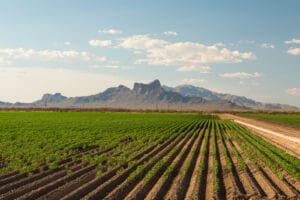If you ask Sen. Jeff Flake about Federal water policy, he’ll tell you that’s something primarily left up to the individual states.
During a 2016 Business of Water Summit speech Wednesday at the downtown Phoenix Hyatt Regency, the senator told a room full of business leaders and water stakeholders the primary principles of federal water policy, warning against future reliance on the federal government.
Water allocation is a state duty, Flake said, and although the federal government plays an important role in water policy, it’s still an issue best left to the states. There have already been many laws, regulations, decrees and court decisions that make up the Law of the River, and if the federal government interferes, trouble and confusion can start, he said.
Arizona has been in a drought since the 1990s, but the state’s past investments in water infrastructure and reservoirs has kept it from imposing water restrictions like California had to do as it suffers through a major drought.
“When you look at the drought we’ve had in the west the last several years, and to see states like California who haven’t planned as well as Arizona has, and Arizona we are really standing on the shoulders of those who have planned in the past,” Flake said.
But relying on the past may not be possible anymore. The Colorado River is expected to have significant water shortfalls when compared to upcoming demand in the coming decades, according to a 2012 Colorado River Basin Supply and Demand Study.
As businesses, municipalities and states feel the strain, calls for federal assistance have risen.
Flake warns against any policy proposals that would rely on federal spending, feeling that state policy has a better change of succeeding without over relying on the federal government.
“I can tell you as the demands of the treasury continue to grow along with the national debt, waiting for the fed to fund policy proposal is not the most effective way for sound water policy,” he stated.
He mentioned there is litlte chance any drought relief provisions will come out of the legislature this year too.
With water issues persisting, Flake said there isn’t enough respect given to existing water and property rights, and those must be respected as policy moves forward.
Some may question water uses in the arid desert, from crop choices to recreational use, but their rights should be protected, he said. Of course there may be opportunities to decrease water use in some areas, but those decisions must be voluntarily made, he added.
During one of the initial panels at the conference, Grady Gammage Jr. said many of the current water laws in place were made decades ago when their main purpose was to get people to move out to the western United States, and settle.
But now the west is one of the most urban and settled areas of the country. Water laws need to transition to an era with new water needs to support a growing economy, he said.
One of the biggest issues that isn’t often talked about is about how much water from the Colorado River is allocated to crops, Gammage said.
According to the 2010 US Geological Survey, 79 percent of Arizona’s water goes to agriculture.
Agriculture use isn’t a bad thing, he said, but there needs to be a way to balance the water use for future needs while still being fair.
So what is being done in Arizona?
Gov. Doug Ducey formed a water council in January comprising of local leaders and water experts across the state. The council will create water augmentation strategies, search for conservation opportunities and investigate funding and infrastructure needs.
The council will report to Ducey annually, and is headed by Thomas Buschatzke, director of Arizona Department of Water Resources.
Arizona also has 9 million acre-feet of emergency reserve water underground, which could serve 18 million households.
The governor is focused on refining supply and demand imbalances in 22 planning areas around the state, starting with rural areas.
Stakeholders across the state have been working hard, and some have voluntarily given up some of their water use in order to avoid a shortage declaration.
Yet, at the end of the day, only time will tell if Arizona can avoid water restrictions.



